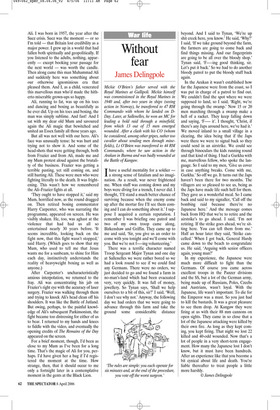Without fear
James Delingpole
Mickie O’Brien’s father served with the Royal Marines at Gallipoli. Mickie himself was commissioned in the Royal Marines in 1940 and, after two years in ships (seeing action in Norway), he transferred to 47 RM Commando with whom he landed on DDay. Later, at Sallenelles, he won an MC for leading a bold raid through a minefield, from which 13 out of 15 men emerged wounded. After a clash with his CO (whom he considered, among other gripes, rather too cavalier about sending men through minefields), Lt O’Brien was transferred to 44 RM Commando, where he saw action in the Arakan in Burma and was badly wounded at the Battle of Kangaw.
Ihave a useful mentality for a soldier a strong sense of fatalism and no imagination. As a result, war never frightened me. When stuff was coming down and my boys were diving for a trench, I never did. I thought, ‘I’ll stand a much better chance of surviving because when the enemy come up after the mortar fire I’ll see them coming and I can do something about it.’ I suppose I acquired a certain reputation. I remember I was briefing one patrol and two of my own troop came along, Birkenshaw and Griffin. They came up to me and said, ‘Sir, you give us an order to come with you tonight and we’ll come with you. But we’re not f–—ing volunteering.’ There was a terrific character named Troop Sergeant Major Tynan and one day at Sallenelles we were rather bored so we had a look round to see if we could find any Germans. There were no orders, we just decided to go and we found a farm in no-man’s-land which had been evacuated very, very quickly. It was full of money, jewellery. So Tynan says, ‘Shall we help ourselves to a bit of this, sir?’ I said, ‘Well, I don’t see why not.’ Anyway, the following day we had orders that we were going to advance through this farm and take the ground some considerable distance beyond. And I said to Tynan, ‘We’re up shit creek here, you know.’ He said, ‘Why?’ I said, ‘If we take ground beyond the farm, the farmers are going to come back and find things missing. And our fingerprints are going to be all over the bloody shop.’ Tynan said, ‘F–—ing good thinking, sir. Let’s put it back.’ So we had to do another bloody patrol to put the bloody stuff back again.
In the Arakan it wasn’t established how far the Japanese were from the coast, so I was put in charge of a patrol to find out. We couldn’t find the spot where we were supposed to land, so I said, ‘Right, we’re going through the swamp.’ Now 15 or 20 men marching through a swamp make a hell of a racket. They keep falling down and saying, ‘F—– it’. I thought, ‘Christ, if there’s any Japs around here, we’ve had it.’ We moved inland to a small village in a clearing, the idea being that if the Japs were there we were to signal back so they could send in an airstrike. We could see through binoculars the kids running round and that kind of thing. I had a Gurkha with me, marvellous fellow, who spoke the language. So I said to my men, ‘Give us cover in case anything breaks. Come with me, Gurkha.’ So off we go. It turns out the Japs haven’t been there for two months. The villagers are so pleased to see us, being as the Japs have made life such hell for them. They gave us a wonderful meal. So I came back and said to my signaller, ‘Call off the bombing raid because there’re no Japanese here.’ And the message comes back from HQ that we’re to retire and the airstrike’s to go ahead. I said, ‘I’m not retiring. If the strike goes ahead, we’re sitting here. You can tell them from me.’ Half an hour later they said, ‘Strike cancelled.’ When I got back, General Hardy came down to the beach to congratulate us. He said, ‘Arguing with senior officers again, young man?’ In my experience, the Japanese were much more difficult to fight than the Germans. Of course you came across excellent troops in the Panzer divisions and the SS, but a lot of the German army, being made up of Russians, Poles, Czechs and Austrians, wasn’t loyal. With the Japanese, life wasn’t important. To die for the Emperor was a must. So you just had to kill the bastards. It was a great pleasure to see them drop. At Kangaw they were firing at us with their 88 mm cannons on open sights. They came in so close that a lot of the Japanese attacking were killed by their own fire. As long as they kept coming, you kept firing. That night we lost 22 killed and 40-odd wounded. Now that’s a lot of people in a very short-term engagement. How many the Japanese lost I don’t know, but it must have been hundreds. After an experience like that you become a bit cynical about life and death. You’re liable thereafter to treat people a little more harshly.
© James Delingpole










































































 Previous page
Previous page